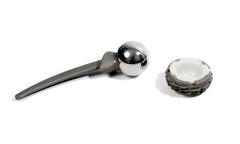OMNI Apex K2 Hip Replacement
Marketed by Massachusetts-based OMNI Life Science, the Apex K2 Hip Replacement is a modular system that allows a surgeon to create a custom fit for each individual patient. However, mounting evidence indicates that the OMNI Apex K2 Hip Replacement System may be associated with high rates of wear, fretting and corrosion, which could cause the device to fail within just one year of its initial implantation.
The OMNI Apex K2 Modular Hip System
The Apex K2 Modular Hip System was developed by Apex Surgical, a medical device manufacturer that was acquired by OMNIlifescience, Inc. in 2004. A decade later, OMNIlifescience was rebranded as OMNI.
 The U.S. Food & Drug Administration (FDA) cleared the OMNI Apex K2 Hip Replacement for sale in 2004, via its 510(K) clearance program. This program does not require that a device manufacturer conduct human clinical trials if the company is able to demonstrate that a new product is substantially equivalent in design to a predicate device that was previously approved by the FDA.
The U.S. Food & Drug Administration (FDA) cleared the OMNI Apex K2 Hip Replacement for sale in 2004, via its 510(K) clearance program. This program does not require that a device manufacturer conduct human clinical trials if the company is able to demonstrate that a new product is substantially equivalent in design to a predicate device that was previously approved by the FDA.
An OMNI Apex K2 Hip Replacement is made up of a femoral stem, modular neck and modular head that can be altered to find the right fit for each patient’s unique body type. The stem and neck are constructed of titanium alloy, except for a ‘Dual-Press’ modular connection at the stem/neck interface that incorporates a cobalt-chromium anti-rotation peg. According to OMNI, the system’s various neck and head components can be combined to create 96 different configurations.
The Apex K2 Modular Hip System and Premature Device Failure
In 2012, the Australian Therapeutic Goods Administration (TGA) cancelled its approval of the Apex K2 Hip Femoral Stem, prompting their withdrawal from that market. The TGA acted after data collected by the Australian Orthopaedic Association National Joint Replacement Registry found that 5.5% of those implanted with an Apex K2 device required revision within one year of surgery, while 9.3% underwent revision at three years.
In October 2015, a study appearing in the Journal of Arthroplasty suggested that the Apex K2 hip implant was associated with a high rate of wear and other serious complications that could ultimately result in premature device failure. The research, which was conducted by Dr. Michael Kent and colleagues at the Perth Orthopaedic Institute in Australia, followed 95 patients who received an Apex K2 hip stem for two years. During that time, the research team discovered “potentially concerning subsidence (breaking down) of both stems” and “corrosion (wearing down)” of the neck and stem, which could lead to device failure and the release of toxic metal particles into the bloodstream. Of the 95 subjects followed:
- 17 patients experienced dislocation, blood clots, infections and reactions to metal particle shed from the device.
- Two reported pain and presented with tissue reactions associated with higher levels of cobalt and chromium in their blood and tissue.
- At least two patients underwent 2-stage revision due to deep joint infection.
- Some patients suffered from aseptic, lymphocyte-dominated vasculitis-associated lesion (ALVAL), a condition associated with swelling and the formation of pseudotumors in the tissue surrounding the joint.
OMNI Apex K2 Hip Replacement Lawsuit Investigation
The nationwide law firm of Bernstein Liebhard LLP is now offering free legal consultations to individuals who may have experienced premature failure of an Apex K2 hip implant. To learn more, please call (888) 994-5118 to speak with one of our attorneys today.
- FDA (2004) “Apex K2 Hip Stem” http://www.accessdata.fda.gov/cdrh_docs/pdf4/k041950.pdf
- Australian TGA (2012) “Apex K2 Femoral Stem (used in hip replacements) – Cancelled Due to High Revision Rates” https://www.tga.gov.au/alert/apex-k2-femoral-stem-used-hip-replacements
- Journal of Arthroplasty (2015) “Stem migration and fretting corrosion of the anti-rotation pin in the K2/Apex hip system” http://www.arthroplastyjournal.org/article/S0883-5403%2815%2900899-2/abstract?cc=y=
Get the latest news and litigation updates about this case by following us on Facebook. Click the "Like" button below.
Follow Us


